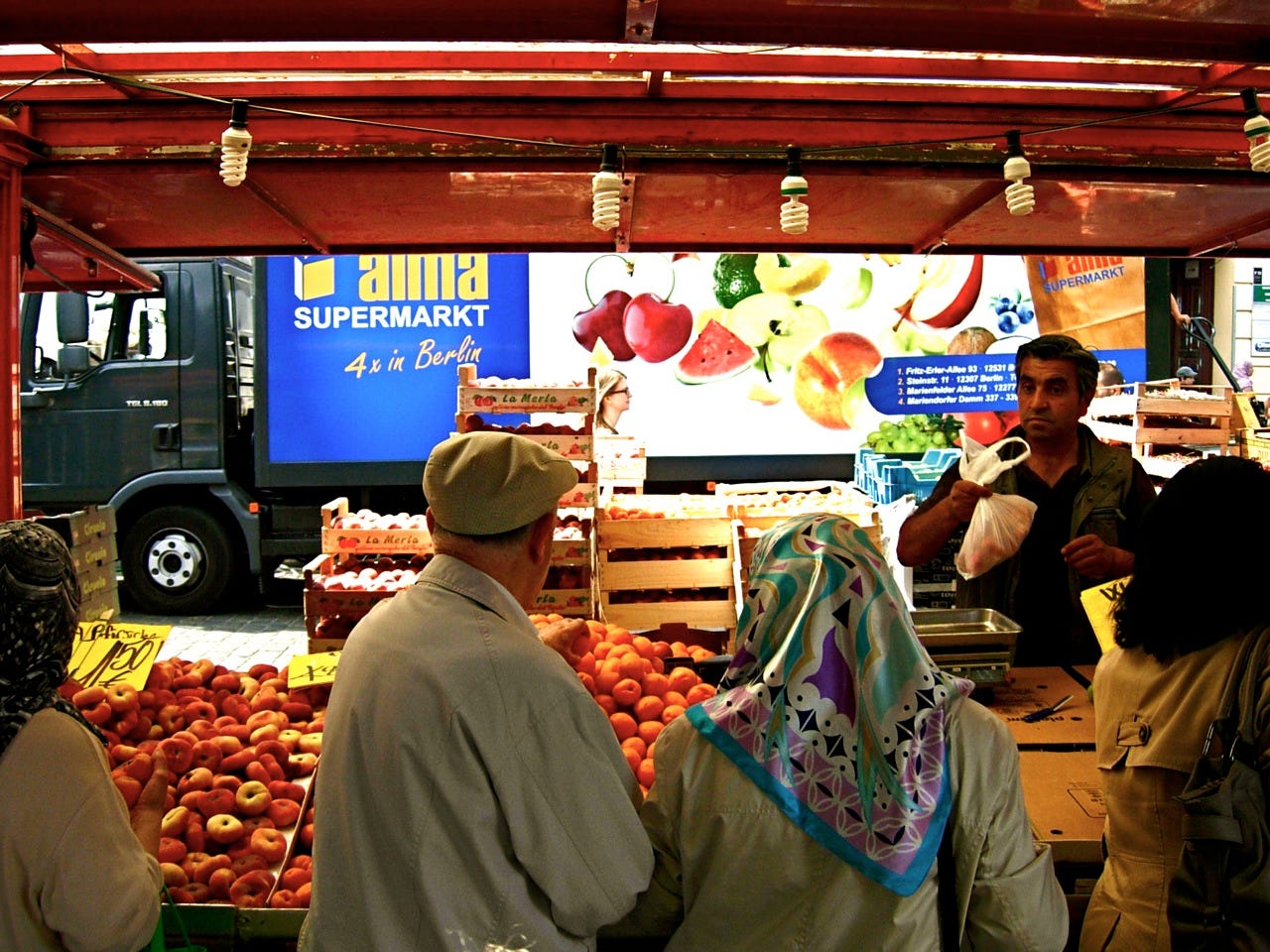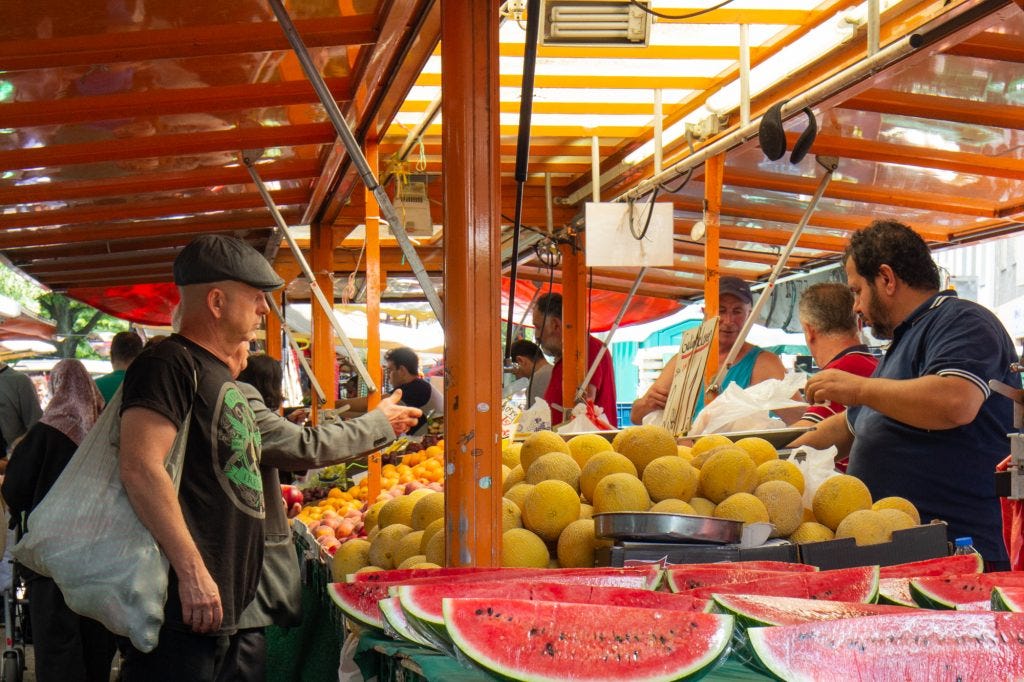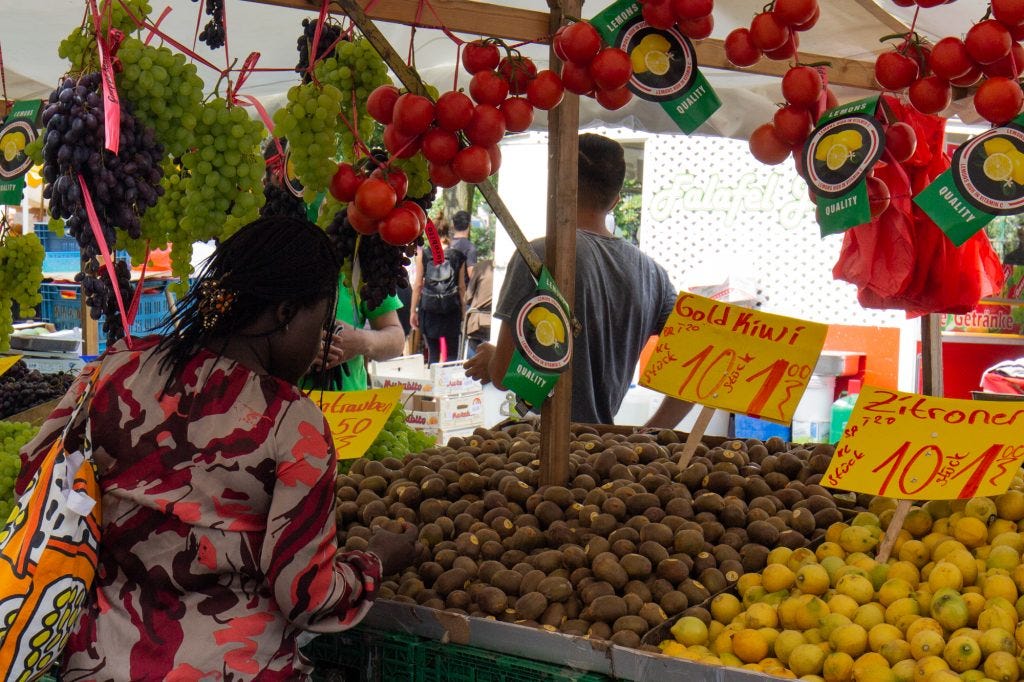Could Brandenburg feed Berlin?
And what the cooking oil shortage tells us about weaknesses in our food system. An interview with Samie Blasingame, creator of Food in my Kiez podcast, by Theresa Leisgang.
This is a guest post with the creator of the Food in my Kiez podcast, Samie Blasingame, by journalist and author Theresa Leisgang.
When I first listened to Food in my Kiez, I was immediately impressed. The podcast is exploring the question of how to create a sustainable food system in Berlin, a topic I’ve previously written about, and it really brings this big topic to life.
The podcast takes the listener on a journey around Berlin and Brandenburg, as Samie visits markets, urban farms, restaurants and cafes. Throughout the series we hear from the people she encounters, from farmer-activists to restauranteurs. The result is an engaging listen that reflects the vibrancy and character of Berlin, and the real issues and stakeholders involved in a transition to a more sustainable food system. I would recommend it to all Berliners, but especially foodies, gardeners, and those interested in sustainability.
“You can grow a cucumber in a monoculture, pump it with fertilizers and transport it to many places before it reaches your plate. It will taste great served with a lot of salt, oil and spices, but is it really good?”
Samie’s background in environmental policy and intercultural studies, and she is a member of the Berlin-based climate and environmental justice collective, Black Earth. A reality that Samie gets to the core of is that eating sustainably can’t just be for the small number of people that can afford to buy regional and organic food at LPG, and conversations about the “future of food” in the city are often missing the perspectives of non-white communities and their food needs.
In this interview, journalist and author Theresa Leisgang speaks with Samie about what she has learnt so far, what the growing instability of food supply chains across the world means for us, and what we can do to participate in building an equitable, resilient and sustainable urban food system.
You have spent more than a year researching the food system and the culture around it in Berlin - what drove your interest in these topics?
Well, I think I’ve always been a food lover. I find lots of joy in gathering around food, trying new things and learning new things through food. I grew up in a suburb of San Francisco, my mum was a former hippie and it was important to her what food was available to us. Even though she was a single working mum, our house was always full of organic snacks. That’s something my friends remember until today.
When I moved to Europe, I spent a few years in Spain, La Rioja, where they produce lots of wine and in learning more about wine what stood out for me was how much the type of land influenced the taste. You can grow the same grape on different soils and the wine will taste different!
So far, what definitions of “good food” have you encountered?
When I would ask people on the street what they think good food is, most would answer: Oh, that Italian place on the corner, that's good food. They think of a meal and a place that serves a meal, not the ingredients that go into that meal.
You can grow a cucumber in a monoculture, pump it with fertilizers and transport it to many places before it reaches your plate. It will taste great served with a lot of salt, oil and spices, but is it really good?
For me, good food is produced in a way that is respectful of the resources that were required to produce it: land, water and transport resources, but also human resources.
Many people have been surprised that the attacks on Ukraine have impacted food prices and even the availability of certain goods, like oil. This will not be the last crisis to come. You have done extensive research into how the climate crisis will affect our food system. What will be the next surprise?
Well water scarcity is another big issue we are facing globally. It's not the top of the conversation, but it should be. The predictions are very clear: the climate crisis is changing our climate and the climate affects what we are able to grow.
Historically, the global food system is predicated on farmers in many places growing certain things, and there being this global system of trade. Now, with the war in Ukraine we see how global violence and power can easily affect the systems we have become accustomed to. We might be missing sunflower oil in Germany, but millions of metric tons of wheat are stuck in the Ukraine and most of those grains were supposed to go to Africa and the Middle East. Local bakers in those regions have started using cassava flour instead of the imported wheat, which I see as very positive, because countries dependent on cheap grains from the EU are actually just an example of colonial continuities.
I think recognising that there are winners and losers in this global food system is really important.
In your podcast, you have been focused on the question: are we building a food system for everyone? Mostly, German discussions about sustainability are held within circles of white middle class people who can afford to go to the organic shops.
Right. It's exactly the type of divide that exists in the general environmental movement. Environmentalism has been framed as a white movement, as if non-white communities haven’t upheld inherently sustainable traditions for generations.
Creating resilience must also involve justice, and food justice requires that we build food systems that encompass the needs of all people across the food economy. Berlin is a city full of many different people and food cultures, so when I continue to find that conversations around the “future of food” here lack the genuine engagement and perspectives of non-white communities, the question of whether the food system is being built for everyone becomes an important thing to consider.
What’s your take on it?
So far, the conversation has focused on issues of class. Nothing happens in a vacuum: our ability to pay for food that is properly priced is affected by our salaries and everything else we must pay for. The culture here in Germany does not value food the way it should, Germans spend the least amount of their income on food compared to other European countries. That is an important part of the issue here, but ultimately, when we're talking about sustainability, we're talking about all of it together! The fact that we're pushing for a rent cap in this city is very important for the ability of some people to be able to afford certain food, or not.
Where is Berlin at in terms of a regenerative, socially inclusive food system?
I think there's lots of positive and inspiring initiatives happening in Berlin already, they just need to grow and inspire the participation of a wider range of the city’s residents. This will only happen if these projects commit to and have the capacity for building the relationships needed to understand the needs of different communities of people.
But beyond that, it's very much a political issue. Brandenburg is full of agricultural land, but only 15% of Berlin’s food comes from the region. The recently launched Ernähunrungsstrategie puts forth a plan to supply public kantines with organic local produce, and of course fine dining restaurants have the resources to source from specific farms too, but I still wonder what that means for the everyday eateries and Imbisses that a majority of the city eats at on a daily basis.
Would it be possible for Brandenburg to feed Berlin?
Theoretically, yes. The Berliner Ernährungsrat published a report last fall called “Berlin isst anders!” and it states that Berlin could be fed by farmland within a 100 km radius around the city. If we were to eat less meat and reduce food waste, that radius would still shrink considerably. In practice, however, Brandenburg feeds a lot of pigs and cows and the world market instead of the city.
For the podcast I also interviewed Farmer-activist Julia Baar-Tal, who is fighting for an Agrarstrukturgesetz that basically regulates how land in Brandenburg can be sold and to whom. Due to the current economic and environmental climate, thousands of family farms close each year, and land is being sold out to investors who do not care about building a regenerative food system.
If more farms switched to growing organic vegetables instead of biomass or maiz, would the Döner Imbiss at the corner choose to source it locally?
One step in the food system that is often overlooked is logistics. I talked to the owner of Humbaba Falafel in Moabit, and in this conversation it was quite clear that he cares a lot about the quality of the main ingredients he is ordering from the Grossmarkt: chicken and chickpeas. Although he was interested in learning more about the local farmers he could source from instead, what is most important to him is that he can rely on the supply. If it was the case that local farms were starting to grow chickpeas, which actually a few farmers are starting to grow now in Brandenburg with a hotter climate, then he would be open to it.
It’s often said that “food is political”. Do you think about politics whenever you are having a meal?
In a way, yes, but that doesn’t mean I’m perfect and you’re not! As much as many of the issues we are facing with the climate crisis are structural and dependent on an abolishment of capitalist greed, there are of course always things that we, as individual consumers, can do to help the system move toward resilience.
The most important thing, in my opinion, is to become active participants in the food system again. Commodification of food and the convenience attached to it has caused many people to become disconnected from how food is produced, where it comes from and the resources that go into it being made available to us every single day. So, consumers can try to resist that by being curious, asking questions and making small changes in their daily habits that collectively result in big shifts in how things will continue to be done.
What would such big shifts look like?
Beyond voting with our wallets, we have to make sure we are supporting policies and politicians that understand and value farming and agriculture as important solutions in dealing with the climate crisis.
But also very concretely on a daily basis: It looks like taking the time to care for one another and to be interested in the question: where does my food come from? What are the consequences of my choice, say, to order food instead of going to the market? Participating in a different type of economy like a Community Supported Agriculture (CSA) is an option that many people still don't know about - or if they do, they say it's too expensive. I don't agree, 20€ per week is not too much. It is less convenient, but more resilient in times of crisis that we are seeing right now.
We also need to really think seriously about building a stronger network along the entire food value chain - meaning we need more small, local processing facilities and food startups who are willing to balance the risk when farmers experiment with new, more sustainable crops. And therefore, we as consumers also need to expand our taste palettes to enjoy new crops and more resilient varieties that can be grown more locally. So again, curiosity, experimentation, building relationships. Food is such a comfort thing, so I understand that shifting food habits is not easy, but it's necessary and very important.
What does the menu of the future look like then?
Well, it looks like less meat and much more varieties of grains, legumes and vegetables. I really look forward to more chefs in the city creating delicious meals without animal products that don’t make meat-loving consumers feel like they are “missing” something. That’s so important - because we have been socialised to think that meat is a necessary part of a nutritious diet, many people don’t know how to imagine meals without it.
The number one thing you have to get used to: not to have a preconceived notion of what you're going to make, because maybe that's not available right now. That is the golden rule of sustainable eating: you don't pre plan your meals, but you make a meal out of what you have.
Is there one last thing you would like to share with us?
The concept of eating locally. There is no official definition, but it is generally understood that local produce comes from within 200 km around a city or a place. When we look at Berlin, that encompasses a lot, including the Polish farmers that sell on many farmers markets. I don't think people really have that idea in mind when they think of eating locally.
And beyond local or regional, what is most important is how the land is being taken care of. You can have produce from local farms that do monocultures, but that is not the future we want. So whether we are eating locally or sourcing something from further away because it can’t be grown here, we have to do what we can to ensure that people and planet are being cared for. That is what I would call the future local.
This article was originally published in Werde magazin in German, and has been translated and edited.
Recommendations from Samie…
1) What to read
“This is a collection of stories and essays written by 60 women at the forefront of the climate movement. Every time I pick it up I am left with pure admiration, renewed hope and revitalised imaginations of all the possibilities we have to build more resilient societies.”
2) What to watch
Papaya & Pommes:
“I am a big fan of educational entertainment and visual media to help communicate the climate crisis. A food friend, Deang, who owns the Panda Noodle in Kreuzberg, created this 5-episode series with Taggesspiegel recently and I find it really great!”





